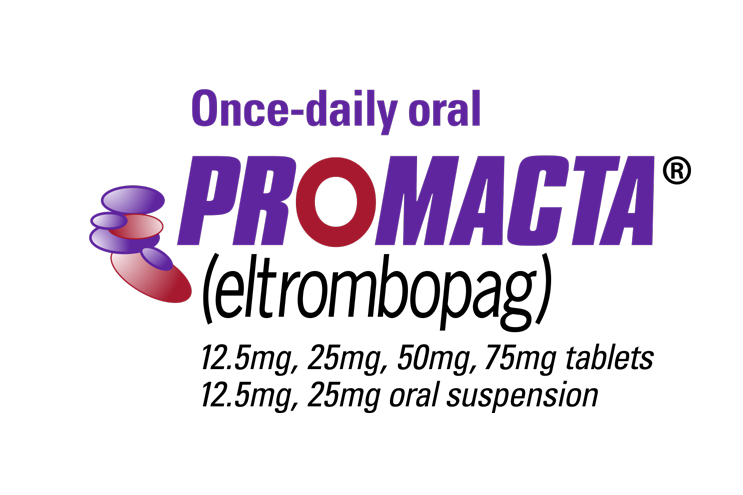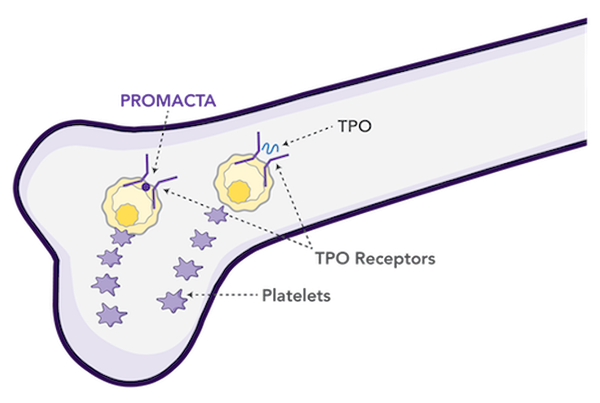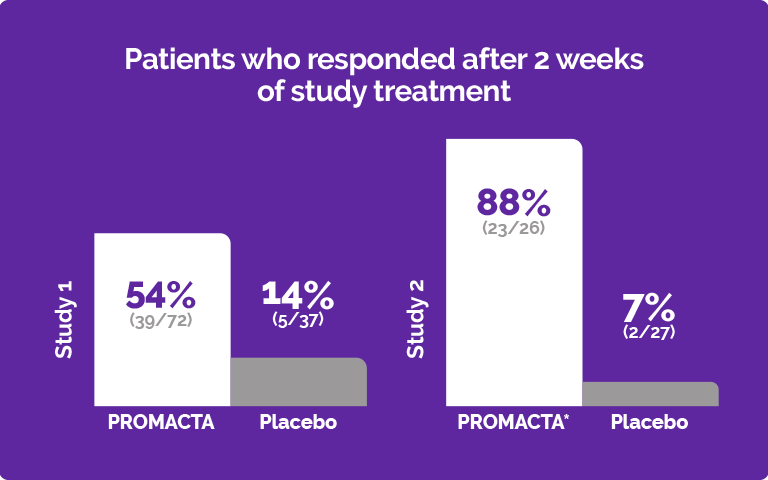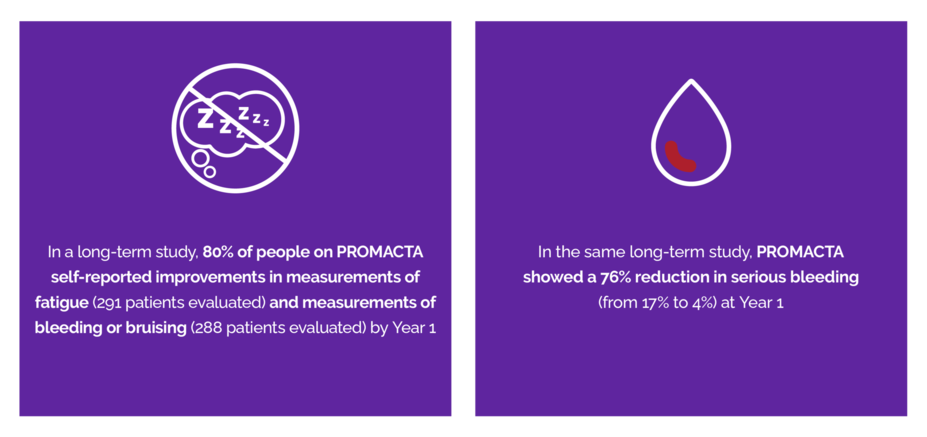How PROMACTA Works
How PROMACTA works for patients with persistent or chronic ITP
When you have low platelets due to persistent or chronic immune thrombocytopenia (ITP), the treatment you start on, such as steroids, may stop working. That's where PROMACTA can help. PROMACTA is a platelet booster that functions differently than steroids or intravenous immunoglobulin (IVIg). It works with your body to create more platelets so it can make up for the ones your body is missing. This, in turn, helps boost platelet counts and may reduce bruising and bleeding caused by persistent or chronic ITP.
How PROMACTA treats persistent or chronic ITP
Illustration is for representative purposes only.
A hormone called thrombopoietin (TPO) naturally creates platelets in your body and, unlike some other drugs used to treat persistent or chronic ITP, PROMACTA acts the same as TPO—working alongside your body to create more platelets.
PROMACTA is a once-daily oral platelet booster that comes in both a tablet and an oral suspension, so even if you can’t swallow a pill, you can still count on a once-daily oral therapy. Some other ITP treatments require you to visit your doctor for an injection, while PROMACTA can be taken at home, at work, or on the go!
Take PROMACTA:
Without a meal or with a meal low in calcium (≤50 mg)
2 hours before or 4 hours after taking medications like antacids, mineral supplements, or foods high in calcium, such as dairy products, calcium-fortified juices, and certain fruits and vegetables
PROMACTA may boost your platelet count and keep the levels stable. See below to learn more about how PROMACTA performed in clinical studies in people with persistent or chronic ITP.
How does PROMACTA work?
Have other treatments, such as steroids or IVIg, not worked to keep your platelet levels stable, or have they caused too many side effects?
PROMACTA may be an option to treat your persistent or chronic ITP that is due to low platelets. Once-daily PROMACTA may quickly boost your platelet counts and keep them stable over time. It is not used to make your platelet counts normal.
PROMACTA has been studied extensively in more people with persistent or chronic ITP than any other drug of its kind, including 3 clinical trials for adults and 1 long-term study that lasted 7 years. More than 700 adults were enrolled in the 3 separate studies and 302 of them went on to participate in the long-term study, which was the longest and largest ever run in persistent or chronic ITP.
Did you know PROMACTA is also proven to work for children with persistent or chronic ITP as young as 1 year old? Go here to learn more.
PROMACTA is proven to boost platelet counts
PROMACTA worked fast
In 2 separate trials, the majority of patients achieved their target platelet goal (≥50,000/mcL) in as early as 2 weeks.
*Results for patients receiving 50 mg PROMACTA once daily.
The primary end point of both studies was response rate at Day 43. In Study 1, 59% (43/73) of patients receiving PROMACTA had achieved a response at Day 43 (vs 16% [6/37] for placebo). In Study 2, 70% (19/27) of patients receiving PROMACTA* had achieved a response at Day 43 (vs 11% [3/27] for placebo).
In a clinical trial of 302 adults with persistent or chronic ITP, PROMACTA demonstrated long-term results.
PROMACTA may also help with fatigue, bleeding, and bruising due to reduced platelet counts
A wide range of patients were included in these clinical studies
Data from 3 clinical studies and 1 long-term study of PROMACTA | |
% of Males | 31%-39% |
% of Females | 61%-69% |
Median Age | 47-52 years old |
Average Starting Platelet Counts in | Less than 30,000/mcL |
Did you know? ITP affects more women than men, at a rate of almost 2:1.
†Consistently proven across studies TRA100773B and TRA100773A (platelet count response ≥50 x 109/L), RAISE study (mean number of weeks with platelet counts ≥50 x 109/L and requirement for rescue therapy), and PETIT2/PETIT studies (platelet count response ≥50 x 109/L without rescue).
PROMACTA has demonstrated consistent safety, study after study
No other treatment for persistent or chronic ITP has been studied more than PROMACTA:
The safety of PROMACTA was established in ~900 people, ranging in age from 1 to 85
No single side effect occurred in more than 10% of people across 4 clinical studies
PROMACTA may cause serious side effects, including liver problems, blood clots, and cataracts
The most common side effects of PROMACTA in adults and children include:
low red blood cell count (anemia)
nausea
fever
abnormal liver function tests
cough
tiredness
headache
diarrhea
See additional safety information in the full Prescribing Information
At 6 years of treatment, no new side effects were seen in comparison with the short-term trials





